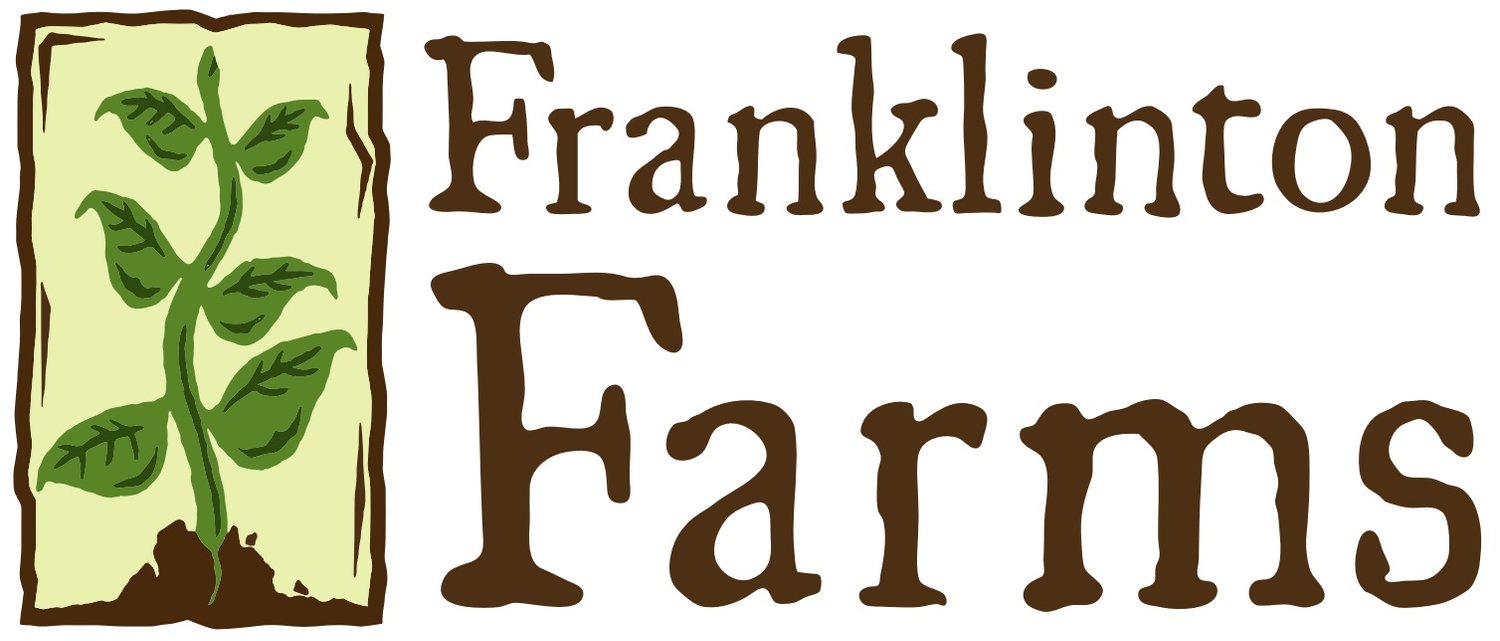Honoring Black Heroes
RECOGNIZING BLACK HISTORY: BLACK PEOPLE WHO CHANGED THE COURSE OF MODERN AGRICULTURE.
Franklinton Farms operates the land with intention and bases its best practices on those passed down from generation to generation of oppressed communities who farmed brilliantly.
We need to start by saying that our respect for the land includes the Indigenous peoples who stewarded this Place long before us. We acknowledge our land as the historic and modern territory of the Delaware, Shawnee, Mingo, Ojibwe, Peoria, Potawatomi, Wyandotte, Miami, Cherokee, and Seneca peoples.
We also acknowledge the oppressive history of agriculture in this country that includes enslavement of Black peoples for several hundred years, disrupting any sense of the proper cost of farmed goods, and establishing white peoples’ ownership of land and capital. We are all still benefiting from agricultural knowledge that arrived with the enslaved peoples.
Finally, we readily acknowledge that some of our Farm Gardens used to be homes for Franklinton families that became vacant lots.
We reckon with all of these critical histories as we farm, and hope our presence on the land honors the lives of the many people who have come before us.
The Future of Black History is Female
So we know, even without names recorded on paper, that Black women have always farmed, have always started communities and collectives, always began movements. From the time when they wove seeds into their hair as they were kidnapped from their homes and enslaved in the new world, Black women have looked to a future that they believed they had the power to create.
Harriet Tubman’s final words were “I go to prepare a place for you.”
Not only did she spend her life leading her people to freedom on the underground railroad, she knew that her death was not a finality but an opening for other Black activists to take her place.
The road from her time to our time has been filled with horrific acts, hatred, indecency, murder, systemic and oppressive racism. Sometimes it can feel as if there is no end in sight - America the beautiful dream was built on the backs of the people it enslaved. There’s no changing that part in our past or the generational trauma it caused that has been passed down to both Black and white peoples today.
To Black peoples from the knowable and unknowable hurts their ancestors felt and the recent hurts their families felt and continue to feel.
And to white peoples for the knowable and unknowable hurts their ancestors caused and the recent hurts that are ongoing and are no longer allowed to continue without notice.
This hurt demands excavation. This is our history. We must acknowledge it with our faces forward lest it skip by us, land onto our children, and become their future.
How To Maximize The Gifts of Intergenerational Trauma | Carolyn Coker Ross, MD
While recognizing Black trauma should and must continue, we must also acknowledge and look for Black joy. Black people suffered but they also succeeded, survived, invented, enacted change, created, and thrived in a world that stacked everything against them.
Here we want to acknowledge Black women today and specifically Black women farmers and their joy.
From the standpoint of the agricultural history of Black people in America, and when searching that history of Black women farmers, it is difficult to follow their roles, find their stories and their leaders. Mostly this is due to poor sources and lack of records - a cause of the current system in place.
“Today, we can only imagine what would have happened if the editors of [Agricultural History] had invited Helen G. Edmonds, a historian of fusion politics... to contribute to the pages of this journal during the 1940s, 1950s, and 1960s. How would her contribution have changed the way scholars understood black and white farmers’ influence on agrarian politics? … How might that have shaped the historiography of United States agriculture?... How might it have changed the plight of American farmers, and informed the state of American agriculture today?”
But nevertheless they were there, finding what joy they could, keeping homes, working the earth, having babies, caring for their families, planting seeds, growing food, creating nourishment.
There were records of the creation of Black sisterhood through home demonstration clubs, or homemaker clubs, in the early 1900’s in states like Montana, Oklahoma and Georgia. These clubs focused on what would now be considered home economics - nutrition, sewing, gardening, canning, and general improvement of their families living conditions.
These clubs gave Black women a source of socialization, togetherness, education and educating, and built a community for them in rural towns as well as a sense of pride and empowerment within Black homes.
“Whether they were farmers, agricultural professionals, public health professionals, or activists, these women could never separate their labor in the rural South from the larger project of civil rights and economic justice.”
Black women have always been at the center of social and political movements whether it be Black empowerment (Rosa Parks, Claudette Colvin, Dorothy Height etc.), Female Empowerment (Angela Davis, Ella Baker, Shirley Chisholm etc.) or LGBT Empowerment (Audre Lorde, Marsha P Johnson, Miss Major Griffin Gacy etc.). Recognition for these leader’s efforts is only starting to be fully acknowledged now.
And those fights - that history - is still ongoing too. We are right now building the language of future generations as we vocally acknowledge the warriors of our time. The fight for food justice and food equality has always been part of the resistance - the caretakers of the land knowing the power and hope they sowed in the earth.
Their seeds continue to be planted today. Below are just some Black women and Women of Color who are modern day farmers and activists that deserve our time for the efforts they are doing to improve and heal their communities. If you can, take a minute to read their names out loud so that your own voice can pass them on when needed.
Frances Perez-Rodriguez - member of La Finca De Sur Community Farm & market manager of Rise and Root Farm, New York
Erika Boyd & Kirsten Ussery - co-owners of Detroit Vegan Soul
Francesca Chaney - owner of Sol Sips in Brooklyn, New York
Julia Collins - co-founder and the former President of Zume Pizza located in Mountain view, California
Tanya Fields - founder and executive director of The Black Feminist Project, Tanya Fields is a food justice activist and educator.
Jinji Fraser - Pure chocolate by Jinji, Baltimore
Kanchan Dawn Hunter - co-creator of Spiral Gardens, a nursery, community farm and produce stand.
Cynthia Nevels - owner of the Dallas based award-winning food truck SoulGood.
Jamila Norman - world-renowned urban farmer and food activist in Atlanta, Georgia
Leah Penniman - a Black Kreyol farmer, activist and founder of Soul Fire Farm, a community farm in Petersburg
Safia Rashid - certified in sustainable urban agriculture and is the owner of Your Bountiful Harvest located in Chicago, Illinois, a sustainable urban farm and garden consultation service.
Gail Taylor - As owner and operator of Three Part Harmony Farm in northeast Washington, D.C., Gail Taylor supplies organic and local produce to her community through a multi-farm CSA, meaning that the share of fresh produce will include produce from partner farms, expanding the array of veggies that one receives.
Karen Washington - farmer, activist, physical therapist and board member of the New York Botanical Garden.
These women, along with many others, are seeking to return Black joy to agriculture, growing food, and farming.
In Columbus, we need look no further than Bronzeville Growers Market and the Growing and Growth Collective, as well as other Black-led farms, Tiger Mushroom Farm and Southside Family Farms.
From a rich history of brilliant farming, it is inspiring and motivational to see these farmers continue the journey from the building blocks left by their ancestors.
Pan African Answers for Food InJustice | Julialynne Walker | Bronzeville Growers Market
As our final post for Black History Month, we would ask you to take this knowledge and further it yourself. We have only begun to scratch the surface here of just what we owe to Black trauma and Black joy. To Black men and Black women.
We will continue to do the work and continue to honor black heroes.
Let’s excavate the hurt and improve ourselves for the generations coming.
A beautiful introduction by Leah Penniman to her book “Farming While Black”.
Continue the conversation on March 27th
Join the Growing and Growth Collectives talk on: Freedom Farmers: Agricultural Resistance and the Black Freedom Movement (Justice, Power, and Politics) By Monica B. White
Register here: https://us02web.zoom.us/meeting/register/tZ0uceGrrz0uH9ydX45ojM6TRmP2tzQh2t4q
Article Sources:
Until Black Women are free, none of us are free.
https://www.un.org/africarenewal/magazine/special-edition-agriculture-2014/gendering-agriculture
https://www.aghistorysociety.org/933-issue
https://muse.jhu.edu/article/263324/pdf
http://www.dirt-mag.com/stories/features/the-coming-of-age-of-a-black-woman-farmer-LC1242926
https://www.pbs.org/wnet/peril-and-promise/2019/03/five-black-farmers/





